
A Just Society
Racism is commonly perceived to be an individual phenomenon as opposed to a collective consequence. Yet when the majority of food deserts in Buffalo, New York are concentrated on the predominantly Black East Side and African American residents are six times more likely than Whites to live in a neighborhood without access to a grocery store, it becomes obvious that the issue cannot be the result of one individual, but instead of systemic racism. A system that is structured to allocate fewer resources to communities of color. A system that allows the White, wealthy residents of Buffalo’s West Side to live across the block from a community starved with food deserts and never give it second thought.
In the movement towards racial justice, it is not enough for me to simply say I am not racist. I live in a racist society, and every day I benefit from racist systems. Racist systems that afford me access to healthy produce just a few minutes away from the sparse food retail environments of People of Color. Racist systems that have afforded me to learn rather than experience these injustices. This is what MLK meant by an “inescapable network of mutuality.” While I may believe that the current system is flawed, I am still benefiting from it; without actively working to dismantle these structures, I am merely maintaining them.
This is what my work as a High Road Fellow with Grassroots Gardens WNY is aiming to accomplish. By researching ways Grassroots Gardens can remain sustainably funded and work towards achieving land tenure, I am helping to cement the presence of community gardens in the City of Buffalo, to end food deserts and inequitable food access across the region.
My experiences in the High Road Fellowship have thus taught me the importance of action. Our decisions do not occur independent of others, each one we make plays a part in either enforcing or challenging the current structures in place. Until we realize the interconnected nature of our decisions, a truly just society is not possible.
